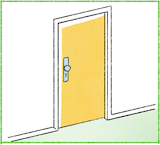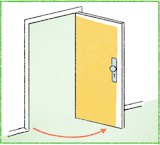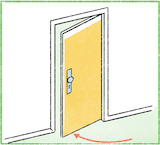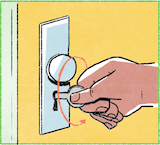



นี้คืออี่หยัง นี้คือปะตู
ปะตูอี่หยัง ปะตูบ้าน
ปะตูตั้งอยู่ใส ปะตูตั้งอยู่ข้างฝาผะหนังบ้าน
ปะตูสีอี่หยัง ปะตูสีเหลียง
ปะตูเฮ็ดมาจากอี่หยัง ปะตูเฮ็ดมาจากไม้ หลือปะตูเฮ็ดมาจากเหล็ก
ปะตูอันใหญ่บ่ ใหญ่ ปะตูอันใหญ่อยู่
ปะตูมีกอนบ่ มี ปะตูมีกอนปะตู
กอนปะตูเฮ็ดมาจากอี่หยัง กอนปะตูเฮ็ดมาจากเหล็ก
แล้วปะตูล็อกได้บ่ ได้อยู่ ปะตูล็อกได้
ปะตูใซ้อี่หยังล็อก ปะตูใซ้กุนแจล็อก
ขั้นปะตูล็อกแล้วสิเปิดได้บ่ เปิดได้อยู่ ขั้นปะตูล็อกแล้วสิเปิดได้อยู่ แต่ว่าต้องมีกุนแจ ขั้นบ่มีกุนแจกะเปิดปะตูบ่ได้
5
ตอนนี้ปะตูมันเป็นอี่หยัง ตอนนี้ปะตูมันกำลังเปิดอยู่
เป็นหญังปะตูมันคือเปิด บ่ลู้คือกันว่าเป็นหญังปะตูมันคือเปิด
พุใดมาเปิดปะตู บ่ลู้คือกันว่าพุใดมาเปิดปะตู
เป็นหญังเขาคือเปิดปะตู บ่ลู้คือกันว่าเป็นหญังเขาคือเปิดปะตู เขาอาดสิไปข้างนอก หลือสิเข้าไปในบ้านกะได้ เขาเลยเปิดปะตู
ปะตูมันเปิดญากบ่ บ่ ปะตูมันเปิดบ่ญาก ปะตูมันเปิดง่ายๆ
6
ปะตูมันกำลังเป็นหญัง ปะตูมันกำลังสิปิด
เป็นหญังปะตูมันคือสิปิด บ่ลู้คือกันว่าเป็นหญังปะตูมันคือสิปิด
พุใดมาปิดปะตู บ่ลู้คือกันว่าพุใดมาปิดปะตู บ่ได้แนมเบิ่ง
ปะตูมันปิดมิดบ่ บ่ ปะตูมันปิดบ่มิด ปะตูมันอ้าซ่าว่าอยู่
คือลู้ว่าปะตูมันกำลังสิปิด กะลู้ เพาะว่าปะตูมันกำลังสิงับเข้าไป
7
เขากำลังเฮ็ดหญัง เขากำลังสิเปิดปะตู
เขาใซ้อี่หยังเปิดปะตู เขาใซ้กุนแจเปิดปะตู
เขาเอาอี่หยังจับกุนแจ เขาใซ้มือของเขาจับกุนแจ
เขาเอากุนแจไว้ใส เขาเสียบกุนแจเข้าไปในกอนปะตู
กุนแจอันใหญ่บ่ บ่ กุนแจอันบ่ใหญ่ กุนแจดอกน้อยๆ
Link to overview page
Link to dictionary
| Isaan | Pronunciation | Tones | Thai | English/Notes |
|---|---|---|---|---|
| นี้ | ni: | HF | นี้ | 1. this 2. here |
| คือ | khʉ: | HR | คือ | 1. to be, to resemble, like, as 2. why {บักหล้าคือบ่เก็บโต่ะแน่ = [addressing a young boy] Why haven't you cleared the table?} |
| อี่หยัง | i:-yaŋ | H-M | อะไร | 1. what {นี้คืออี่หยัง = What is this?} {มื้อนี้เจ้าเฮ็ดอี่หยัง = What are you doing today?} {กินเข้างายกับอี่หยัง = What did you have for breakfast?} 2. something, anything, (in negations) nothing {บ่ต้องเฮ็ดอี่หยังอีกเลยนอกจากใส่ปุย = [we] don't need to do anything besides adding fertilizer} |
| ปะตู | pa-tu: | M-M | ประตู | door |
| บ้าน | ba:n | HF | บ้าน | 1. house, home 2. village (also used as a prefix before the name of a village) 3. home country, home region {บ้านเฮาเฮ็ดเข้าจั่งใด = How do we plant rice in Isaan/Thailand?} |
| ตั้ง | taŋ | HF | ตั้ง | to set/put up, to install, to establish, to erect {เขาตั้งนาลิกาปุกตอนสองโมงเซ้า = he sets the alarm clock to eight o'clock in the morning} {พัดลมตั้งโต่ะ = table fan} {ทะนาคานมันสิไปตั้งไว้อยู่ซู่หม้องเอาโลด = banks are [established/can be found] everywhere!} {ตั้งไฟ = to set up a fire} |
| อยู่ | yu: | H | อยู่ | 1. to be (located) at 2. yet, still 3. auxiliary indicating continuous or progressive action {ทอดปาอยู่ในกะทะ = (in the process of) frying a fish in the pan} {แม่กำลังเมี้ยนเฮียนอยู่ = mother is cleaning/tidying up the house} |
| ใส | sai | M | (ที่)ไหน | 1. where? {สิไปใส = Where are [you] going?} {มาแต่ใส = Where are [you] coming from?} {กะทะอยู่ใส = Where's the pan?} 2. somewhere, anywhere {ใสกะได้ = anywhere, wherever you like} |
| ข้าง | kha:ŋ | LF | ข้าง | 1. side {มีหูจับสองข้าง = there are handles on both sides} 2. next to {วางอยู่ข้างๆ ก่องใบใหญ่ = it's placed next to the large box} {เขายืนอยู่ข้างๆ อีกพุหนึ่ง = he's standing next to another person} 3. clf. for body parts which come in pairs (eyes, ears, legs etc.) {เขามีตาสองข้าง = she has two eyes} |
| ฝาผะหนัง | fa:-pha:-naŋ | M-M-M | ฝาผนัง | wall |
| สี | si: | M | สี | 1. color 2. colored pencil, crayon |
| เหลียง | li:aŋ | M | เหลือง | yellow |
| เฮ็ด | het | H | ทำ | to do, to make |
| มา | ma: | HR | มา | 1. to come 2. auxiliary expressing action towards the present or focal time {กะคุเฮ็ดมาจากอี่หยัง = What is the bucket made of?} {แล้วเขากะเก็บเงินจากพุนั้นมา = and then she takes the money of that person} |
| จาก | ja:k | LF | จาก | 1. from {... เฮ็ดมาจากอี่หยัง = ... is made from what?} 2. to depart |
| ไม้ | mai | HF | ไม้ | wood, tree |
| หลือ | lʉ: | M | หรือ | or |
| เหล็ก | lek | M | เหล็ก | iron, steel, metal |
| อัน | an | M | อัน | 1. thing, object 2. general clf. for objects |
| ใหญ่ | ɲai | H | ใหญ่ | large, big |
| บ่ | bɔ: | H | ไม่ | 1. no, not 2. question particle, transforming a statement into a question Notes: spelling exception in line with common usage on social media |
| มี | mi: | HR | มี | 1. to have 2. there is |
| กอน | gɔ:n | M | กลอน | bolt, lock |
| แล้ว | lɛ:o | HF | แล้ว | 1. finished 2. already 3. and then, and next (especially แล้วกะ) 4. auxiliary for past tense |
| ล็อก | lɔk | H | ล็อค | 1. to lock 2. lock (noun) |
| ได้ | dai | HF | ได้ | 1. can 2. to get, to obtain 3. before verb: indicating past tense 4. บ่ได้ + verb: not |
| ใซ้ | sai | HF | ใช้ | to use |
| กุนแจ | gun-jɛ: | M-M | กุญแจ | key Notes: see also กุนแก |
| ขั้น | khan | LF | เมื่อ | when, if |
| สิ | si | M | จะ | future tense auxiliary {เขากำลังสิตื่น = he's about to wake up} {สิไปตะหลาด = [I'm] going to the market} |
| เปิด | pə:t | M | เปิด | 1. to open {เปิดหน้าต่าง = to open the window} {เปิดปะตู = to open the door} 2. to start, to switch on {เปิดไฟ = to switch on the light} {เปิดแอ = to switch on the A/C} |
| แต่ว่า | tɛ:-wa: | H-H | แต่ว่า | 1. but 2. only {ฮู้แต่ว่าเขายืนอยู่พุเดียว = I only know that he's standing there by himself} |
| ต้อง | tɔŋ | HF | ต้อง | to have to, must |
| กะ | ga | M | ก็ | 1. then, consequently 2. also |
| ตอนนี้ | tɔ:n-ni: | M-HF | ตอนนี้ | now |
| มัน | man | HR | มัน | it (also used to refer to people) |
| เป็น | pen | M | เป็น | 1. to be, to exist 2. to be able to 3. to suffer, sth. happens to 4. เป็นหญัง[...]คือ in initial position: why? {เป็นหญังเขากะคือแปงฟัน = Why is he brushing his teeth?} {เป็นหญังเคี่ยงบินมันคือสิตก = Why is the airplane falling down?} |
| กำลัง | gam-laŋ | M-HR | กำลัง | auxiliary indicating continuous or progressive action |
| หญัง | ɲaŋ | M | อะไร, เป็นหญัง = ทำไม | 1. what {เขากำลังเฮ็ดหญัง = What is he doing?} {ธูปเอาไว้เฮ็ดหญัง = What are incense sticks for?} 2. something, anything, (nothing) 3. เป็นหญัง[...]คือ in initial position: why {เป็นหญังเขาคือใส่บักพิกลงไปในกวยเตียว = Why is he putting chili in [his] noodle soup?} {เป็นหญังหน้าต่างมันคือเปิด = Why is the window open?} {เป็นหญังมันคือมีควนไฟ = Why is there smoke?} |
| ลู้ | lu: | HF | รู้ | 1. to know 2. to understand Notes: equivalent to ฮู้ |
| คือกัน | khʉ:-gan | HR-M | เหมือนกัน | 1. also, likewise, similarly {ยินดีที่ได้ฮู้จักคือกันคับ = Nice to meet you too!} 2. in negative sentences: either {บ่ลู้คือกัน = I don't know either} {จักคือกัน = I don't know (either)} |
| ว่า | wa: | H | ว่า | 1. that, as {คำว่า X = the word X} 2. to say |
| พุใด | phu-dai | H-M | ใคร | 1. who {มีพุใดโทมากะบ่ลู้ = I don't know who has called} {ห้องนอนของพุใด = whose bedroom (is this)? } 2. someone, somebody, anybody, in negative context: nobody {บ่มีพุใดอยู่กับเขาเลย = there's nobody with him} |
| เขา | khao | M | เขา | personal pronoun: he, she |
| อาด | a:t | LF | อาจ | 1. might, may, will 2. likely |
| ไป | pai | M | ไป | 1. to go 2. auxiliary indicating action extending into the future |
| ข้างนอก | kha:ŋ-nɔ:k | LF-HF | ข้างนอก | outside |
| เข้า | khao | LF | เข้า | to enter, to go inside, to come/go in/on {เข้าห้องน้ำ = to go to the bathroom} {เข้านอน = to go to bed} {ขี่เลียเข้าไปเกาะ = to take a boat to go on an island} |
| ใน | nai | HR | ใน | in, within |
| เลย | lə:i | HR | เลย | 1. futher on, beyond, past {เข็มน้อยเลยเลขสิบสองไป = the minute hand has passed number twelve} 2. too much 3. at all 4. definitively 5. completely, utterly |
| ญาก | ɲa:k | HF | ยาก | difficult, hard |
| ง่าย | ŋa:i | H | ง่าย | easy, simple, clear |
| ปิด | pit | M | ปิด | 1. to close {ปิดปะตู = to close the door} {ปิดก่อกน้ำ = to close the tap} 2. to finish, to switch off {ปิดไฟ = to switch off the light} {ปิดวิทะยุ = to switch off the radio} |
| แนมเบิ่ง | nɛ:m-bəŋ | HR-H | มองดู | 1. to look at 2. to watch |
| มิด | mit | H | มิด | tight(ly), close(ly) |
| อ้า | a: | HF | อ้า | mouth, door, window: to open, to stand open {อ้าปาก = to open the mouth, to have the mouth open} |
| ซ่าว่า | sa:-wa: | H-H | open {ปะตูอ้าซ่าว่า = the door is standing open} | |
| เพาะว่า | phɔ-wa: | H-H | เพราะว่า | because |
| งับ | ŋap | H | งับ | to close, to shut |
| เอา | ao | M | เอา | to take, to give {เขากำลังเอาก่องไปซั่ง = he's taking the boxes to weigh them} {หมอกำลังเอายาให้คนป่วยกิน = the doctor is giving medicine to the patient} {เอาไว้ถ้า = is for, is used for, has the purpose of} |
| จับ | jap | M | จับ | 1. to grasp, to hold {เขาจับมือกัน = they're holding hands} {เขายืนจับไอติมอยู่ = she's standing, holding an ice cream} 2. to catch, to arrest {จับพุล้าย = to arrest a criminal} |
| มือ | mʉ: | HR | มือ | 1. hand 2. front leg/paw (e.g., of a cat) |
| ของ | khɔ:ŋ | M | ของ | of, belonging to |
| ไว้ | wai | HF | ไว้ | 1. to keep, to put, to place, to retain, to save, to reserve {เขาเอาหัวของเขาไว้ใส = Where does she put her head?} {หมาสิเลี้ยงไว้บ้าน = dogs are kept/raised in the house} {ไก่เลี้ยงไว้ในคอก = chicken are kept/raised in a coop} {หน้ามันบังไว้ = the face is covered/not visible} {เขาเอาโทละสับวางไว้หู = he holds the phone to his ear} 2. for {นาลิกาปุกมีไว้เฮ็ดหญัง = What is an alarm clock for?} {หม้อเอาไว้เฮ็ดแนวกิน = a pot is used to make food} {ก่องเอาไว้เฮ็ดหญัง ก่องเอาไว้ใส่ของ = What is the box for? It's for putting in stuff.} Notes: see also ไว้ถ้า |
| เสียบ | si:ap | LF | เสียบ | to insert, to put in {เสียบปั่ก = to plug in} {ใซ้ซ้อนส้อมเสียบลูกซิ้น = to pick up meat balls with a fork} |
| ดอก | dɔ:k | LF | ดอก | clf. for keys, nails, incense sticks {ธูปสามดอก = three incense sticks} |
| น้อย | nɔ:i | HF | น้อย | 1. few, little 2. small |